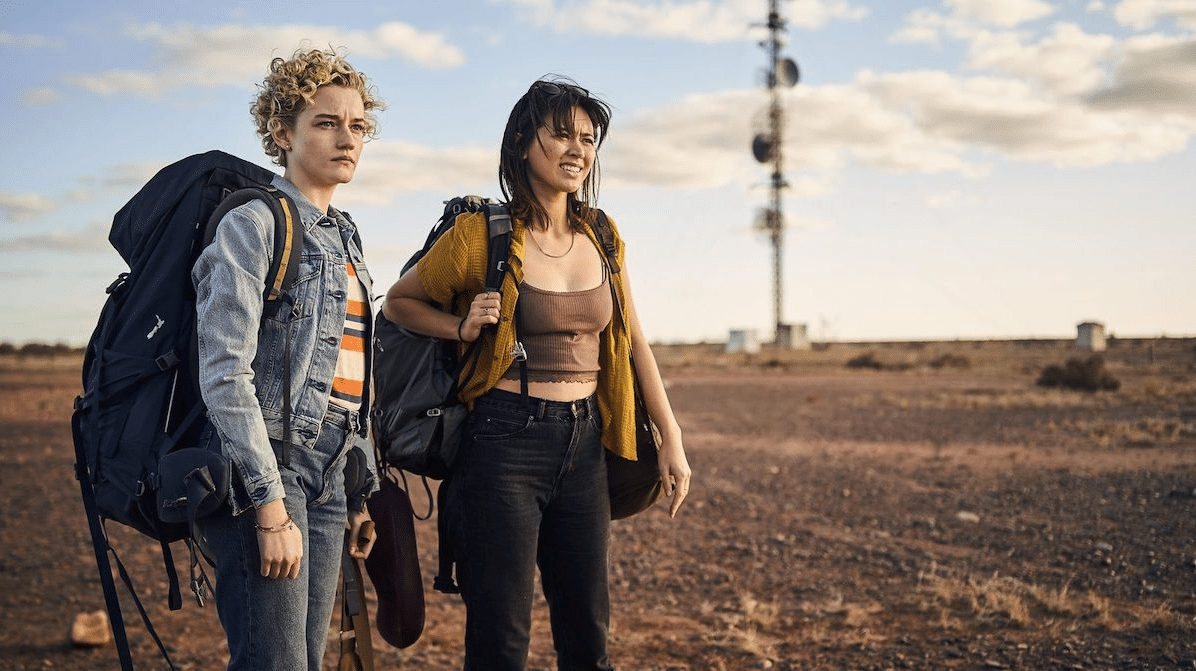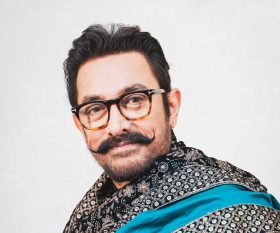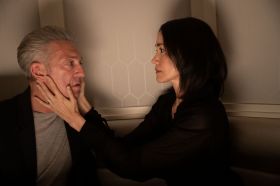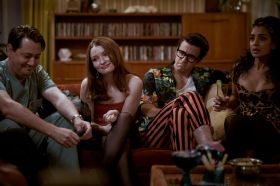Kitty Green’s The Royal Hotel – a stunning feature exploring Australian pub culture and toxic masculinity in the outback as experienced by two female tourists – opened the inaugural SXSW Sydney this week.
It’s easy to see why it was chosen to mark the beginning of a new cultural event in Sydney: the film opens on a cruise ship in Sydney Harbour where our protagonists Hanna (Julia Garner) and Liv (Jessica Henwick) have just discovered they are broke and in dire need of a job. Soon they are trading the stunning vistas of the Harbour Bridge and Opera House for the dusty plateau of a remote mining town, where they get to work as temporary bartenders at The Royal Hotel.
Bar owner Billy (Hugo Weaving) and a host of locals give the girls a riotous introduction to ‘Down Under’ drinking culture – but soon Hanna and Liv find themselves trapped in an unnerving situation that grows rapidly beyond their control.
Melbourne-born writer and director Kitty Green sat down with me to discuss The Royal Hotel, feminism in film, and an imposter syndrome that remains ever-present.
Hi, Kitty. What was your first reaction to the news that The Royal Hotel would be opening SXSW Sydney?
Kitty Green: I was pretty excited! It’s nice to have a big screen and a big audience for your film. A lot of movies go straight to streaming now and it means you miss out on that experience. I made The Assistant during Covid, for example, so we didn’t get that live feedback where you can see the audience react in realtime and chat with them afterwards.
Did people react to The Royal Hotel in the way you were expecting?
I honestly didn’t watch the whole thing at the premiere. I’ve seen it so many times now, and I felt so jet-lagged at the event that I had to go and take a break. A few crew members and the people at See Saw stayed to watch and gauge the ‘temperature’ of the room, and they said it played really well. The jokes worked, apparently, and people also fell silent at all the right spots.
Speaking of jokes, I found it really interesting that we all laughed at the two American girls being called the C word in the beginning, but as it went on it became more uncomfortable. Why did you decide to make that a focal point of the dialogue?
Well yeah, the idea is that you laugh along for a minute and then you become more and more uncomfortable. It’s an interesting thing, because that word doesn’t have the same effect here as it does overseas. Of course the American characters find it shocking, and they can’t really forgive Billy after he calls them that. From the audience perspective, the tipping point from laughter to discomfort happens earlier in the US than it does here.
I think it made us all realise just how casually we use this misogynistic word in Australia.
Yeah, exactly.
Tell me about the inspiration behind this film – there’s a documentary called Hotel Coolgardie (2016) that gets an ‘inspired by’ credit at the close of the film …
Hotel Coolgardie was the inspiration for The Royal Hotel, but we didn’t take any of the character names or dialogue from that film. We built our own world based on the events depicted in the film. I thought that doco was really amazing, the way it depicted Australian drinking culture through the eyes of two foreign women who are completely new to it and having to adjust to the rules of that world as it all unfolds in front of them. The challenge in adapting it was deciding how dark to make it – like, where do we draw the line?
In Coolgardie, the two women are from Finland. Why did you decide to make your characters in Royal Hotel American backpackers?
Honestly? I wrote them as Scandinavian but we couldn’t finance it that way. If we had Scandinavian actors in the lead roles it would have been classed technically as a ‘foreign’ film, but with US actors that wasn’t the case.
That’s really surprising! I would have guessed it was based on Julia Garner’s star power.
Well, that too. It would have been harder to sell with Scandinavian leads.
Where was this film primarily shot? Did you have to have a set built for the pub?
It’s a place about three hours north of Adelaide, where there literally is one pub on the street, and the town has only 29 people in it. They were going to build a railway line out there in the past but that never happened. There are a few houses dotted around, but when you point the camera at the pub it just looks like it’s standing alone in the middle of the desert.
That’s a lucky find – how did you come across this place?
It was the first one on our trip to the rest of the prospective pubs. We were able to convince the owner to lend it to us, so we quite literally took over for a while. The people in town would often stop to have a look at what we were doing. It wasn’t too convenient for them most of the time but I know they all had fun with it.
Can you tell me about the symbolism in the film – such as the empty swimming pool, and the deadly snake that invades the bedroom upstairs?
I was just throwing around ideas. I don’t know if it’s too much of a cliche to use a snake as a metaphor, or an empty pool for that matter. But to me there’s nothing more disappointing than an empty pool, especially being a traveller in a really hot place. I wanted to lean into all the obvious things that would cause tension for the characters, because the idea is that they feel really isolated. And they both worked as devices to create tension at different levels.
Dan Henshall, who plays Dolly, really nails that menacing presence. I really felt genuine terror when he was on screen. What was it like to come down from those really terrifying scenes when making the film?
Dan’s pretty level-headed. He’s able to turn that on without much fuss, and turn it off too. I’ve seen him do that in his other work and I really looked forward to working with him on The Royal Hotel. I also knew that he and Julia [Garner] would make an interesting combination.
The inherent tension of existing as woman in the world is something you keep coming back to in your films – why do you think that is?
Because I’m a woman! It’s funny, everyone talks about my ‘feminist agenda’, and I’m just like ‘no, I’m a woman and this is how I see the world’.
Not that there’s anything wrong with a feminist agenda.
No, not at all. But it’s not what motivates me. My work comes from a place of intrigue. I think the things that I find scary or uncomfortable in the world will always be interesting subject matter to me, whether that’s feeling disrespected in the film industry, or feeling terrified in the pub when surrounded by drunken male patrons.
Do you find it difficult to self-promote your screen work?
Yeah, I do. People will say to me ‘I can’t wait to see the movie!’ and I’ll be like, ‘Oh, you don’t have to!’. It’s just the way I was raised. But also, I think the work should speak for itself, so I really don’t feel the need to talk it up much. I get imposter syndrome, and I do believe that the moment that goes away, I will become an absolute nightmare.
I feel like that would be the least of your worries anyway – especially when one of your films [Ukraine is Not a Brothel, 2013] led to you getting arrested by the KGB!
I honestly had the best time making that film, it was crazy. Even the arrest, despite it being really tense, was exciting because it felt like being in a movie. Making fiction films is a lot more controlled and safer – so I do miss the thrill of the non-fiction feature sometimes.
If you could go back in time and meet yourself when you were a VCA student, what would you say?
I would give myself more encouragement. I’ve always been very hard on myself, so I would say ‘be gentler with yourself’, because I know I’ll get there eventually. Aside from that, I would say ‘keep your emails short’. That’s probably some of the best advice I’ve ever received – a short email gets the receiver’s attention straight away and you almost always get a reply.
What’s next for The Royal Hotel, and what’s next for you?
We’re opening Adelaide Film Festival this week, and then shortly after we’re screening in Brisbane. Then it hits general theatres in November. After that I’m gonna rest for a few weeks before I figure out what’s next. There are scripts coming to me now, but I’m always more motivated by my own ideas, so the next project will probably be something I write.
The Royal Hotel opens in cinemas on 23 November 2023.





